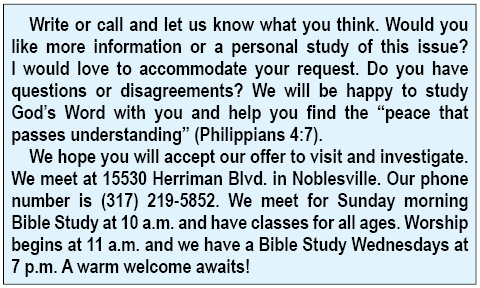“Because I said so” … really?
I suspect we all heard it as a kid growing up and as a parent, we probably said it. Why can’t I do this or that? “Because I told you so!” That might work while we rear our children, but will it work in religion? It comes down to who’s in charge.
Man cannot serve as a reliable standard of authority in matters of religion. My personal judgments, likes, dislikes or opinions do not provide a reliable standard of authority. These things will not lead us to know what God will or will not approve. My judgment or opinion can all too easily be wrong.
The prophet Jeremiah put it this way: “I know, O LORD, that the way of man is not in himself, that it is not in man who walks to direct his steps” (Jeremiah 10:23). The wise man of Proverbs wrote of a way that seems right to man but its end is the way of death (Proverbs 14:12).
A number of years ago, my wife and I were traveling from central Vermont to the airport in Albany, N.Y. In Bennington, Vt., I came to a crossroads and had to decide which direction I would turn. Having been there recently I confidently turned in the direction I knew was right. I was confident and no one could convince me I was not right.
Well, that was until I saw a sign, “Welcome to Massachusetts.” No one in the car dared say a word when I turned around and headed back to Bennington. I knew I was right. It felt right. I had a satisfying feeling in my heart that I was right. But none of these things made it right. Eventually, I was able to laugh about my foolish confidence. It cost me an hour or so of time, but I still got to Albany in time to make my flight. No harm. No foul.
What if I follow my feelings or personal judgments in matters of religion and take the wrong turn? Jesus called worship determined by the doctrines of men vain (Matthew 15:9). The apostle John warns that if we go beyond God’s revealed truth, we don’t have God (2 John 1:9-11). Further he wrote, “If anyone comes to you and does not bring this teaching, do not receive him into your house or give him any greeting, for whoever greets him takes part in his wicked works.”
I fell into the deceitful pit about which Solomon warned me when he wrote, “There is a way that seems right to a man, but its end is the way to death” (Proverbs 14:12). Having been told the direction to turn but ignoring it I proved his statement in Proverbs 12:15 to be true: “The way of a fool is right in his own eyes, but a wise man listens to advice.” Jacob knew Joseph was dead because he had a strong emotional reaction to what he thought was evidence of his death. Saul thought the right thing to do was to persecute Christians.
 Take heed of John’s warning: “Beloved, do not believe every spirit, but test the spirits to see whether they are from God, for many false prophets have gone out into the world” (1 John 4:1).
Take heed of John’s warning: “Beloved, do not believe every spirit, but test the spirits to see whether they are from God, for many false prophets have gone out into the world” (1 John 4:1).
Like the noble Bereans, we need to search the Scriptures to prove things right or wrong (Acts 17:11). We need to be able to open the Scriptures to show why we do what we do it. In this way, we can show that we are not defending an arbitrary law or opinion, but rather the law and judgment of the One who has the final say in all matters.

